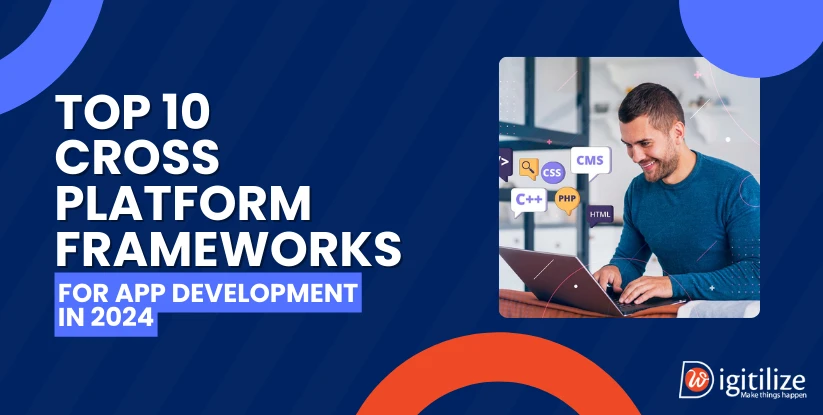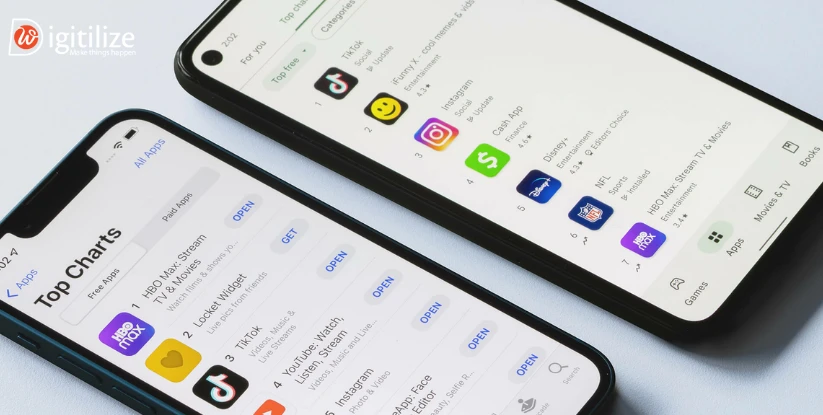Top 10 Cross-Platform Frameworks for App Development in 2024
 In 2024, developing cross-platform apps will surely be the most efficient approach to reach a larger audience at a lower cost. As you are aware, as technology advances, so do the techniques used in the creation of mobile and online applications. So, it’s important to be aware of the top 10 cross-platform frameworks for app development in 2024.
These days, organisations and corporations do all in their power to connect with potential clients via various platforms, including PCs, tablets, smartphones, and desktop computers. With over 6.9 billion smartphone users by 2024, no company can afford to be absent from the widely utilised Android & iOS mobile application development frameworks. Cross-platform app development comes into play here.
Let’s start from the beginning and learn more about cross-platform frameworks development and why it is superior to native programming before looking through the list of cross-platform app development frameworks.
In 2024, developing cross-platform apps will surely be the most efficient approach to reach a larger audience at a lower cost. As you are aware, as technology advances, so do the techniques used in the creation of mobile and online applications. So, it’s important to be aware of the top 10 cross-platform frameworks for app development in 2024.
These days, organisations and corporations do all in their power to connect with potential clients via various platforms, including PCs, tablets, smartphones, and desktop computers. With over 6.9 billion smartphone users by 2024, no company can afford to be absent from the widely utilised Android & iOS mobile application development frameworks. Cross-platform app development comes into play here.
Let’s start from the beginning and learn more about cross-platform frameworks development and why it is superior to native programming before looking through the list of cross-platform app development frameworks.
Understand the cross-platform app development
As the name implies, cross-platform application development is a technique for developing software programmes that work on several mobile platforms or operating systems, such as Windows, iOS, and Android. Cross-platform development is a shining example of efficiency in the app development industry, meeting the various demands of both businesses and developers. Developing apps that function flawlessly across a range of hardware and operating systems is the fundamental goal of cross-platform development. Mobile app frameworks, which permits some or even all source code to be shared between systems, provides a solution to these issues. These key features of hybrid app frameworks have a native appearance and feel because they combine native and independent code. The most economical and efficient way to create applications is to write the code only once and reuse it in other places.Native Vs. Cross platforms app development in 2024
 Making the choice between creating a cross-platform or native app is essential. Mobile app development technologies have several advantages to cross-platform apps, and vice versa. Making decisions will be aided by carefully evaluating your audience, budget, development schedule, performance and security requirements, and other factors.
Making the choice between creating a cross-platform or native app is essential. Mobile app development technologies have several advantages to cross-platform apps, and vice versa. Making decisions will be aided by carefully evaluating your audience, budget, development schedule, performance and security requirements, and other factors.
-
When to sell
-
Safety
-
Achievement
-
Development expenses
Top 10 cross-platform frameworks for app development in 2024

-
Flutter
-
React Native
-
Xamarin
-
Node.js
-
Adobe PhoneGap
-
Sencha Touch
-
Firebase
 Backend-as-a-Service (BaaS) platform Firebase was first established in 2011 as an independent business and then bought by Google in 2014. This framework has a plethora of amazing features, like real-time databases, machine learning, cloud storage, hosting, authentication, and more. Developers worldwide love Firebase, one of the best frameworks for creating cross-platform applications.
This is one of the Top 10 cross-platform frameworks for app development in 2024. Developers can create, launch, and manage applications more quickly and simply with the support of its extensive variety of services and tools. This cloud-hosted platform allows developers to easily and effectively do on-demand scalability.
Backend-as-a-Service (BaaS) platform Firebase was first established in 2011 as an independent business and then bought by Google in 2014. This framework has a plethora of amazing features, like real-time databases, machine learning, cloud storage, hosting, authentication, and more. Developers worldwide love Firebase, one of the best frameworks for creating cross-platform applications.
This is one of the Top 10 cross-platform frameworks for app development in 2024. Developers can create, launch, and manage applications more quickly and simply with the support of its extensive variety of services and tools. This cloud-hosted platform allows developers to easily and effectively do on-demand scalability.
-
Native Script
-
Kotlin Multiplatform
-
Apache Flex
FAQ
Frequently Asked Questions
The future looks promising with continuous improvements in frameworks and tools. Expect better performance, more access to native features, and enhanced development experiences as technology evolves.
Cross-platform frameworks allow developers to create mobile applications that can run on multiple operating systems, such as iOS and Android, using a single codebase. This approach saves time and resources compared to developing separate apps for each platform.
Flutter is still a powerful, actively developing technology with a sizable community. Therefore, Flutter developers don't have to freak out. Continue creating and developing. Please feel free to provide any updates or suggestions in the comments section.
Whether Flutter or Swift is superior for developing web applications depends on a number of things. Nonetheless, Flutter is a great choice when cross-platform development is critical and cost is a major consideration.
Ionic is ideal for building hybrid mobile, web, and desktop apps using web technologies like HTML, CSS, and JavaScript. It's particularly well-suited for apps that need a consistent look and feel across platforms and those that rely heavily on web-based features.
Unity is primarily used for developing 2D and 3D games, VR, and AR applications. It provides a powerful editor, a vast asset store, and robust support for multiple platforms, making it a top choice for game developers.

